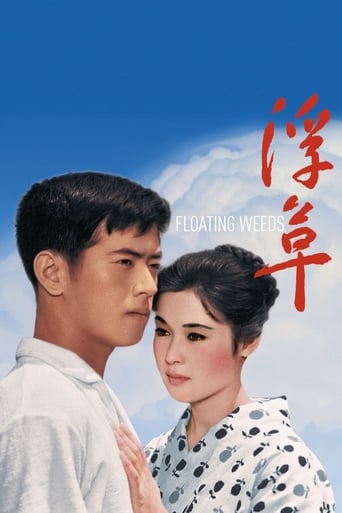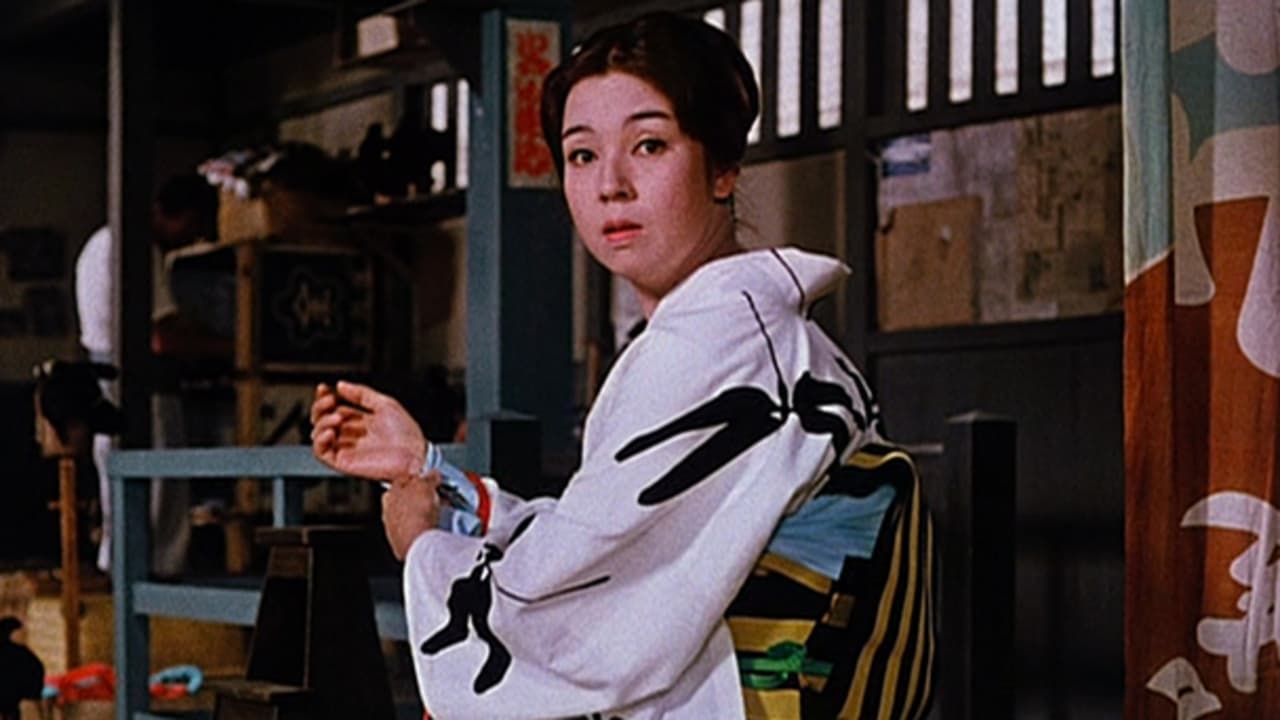Ali Catterall
Ageing, washed-up actor Komajuro (Nakamura) rolls into a sleepy 50s seaside town with his rinky-dink, outdated Kabuki troupe (the film's title being a Japanese term for itinerant actors). Here he seeks to reunite with former lover Oyoshi (Sugimura) and their illegitimate son Kiyoshi (Kawaguchi), who believes the old man is his uncle.When Komajuro's sour-faced mistress Sumiko (Kyô) learns of the affair, she engineers a doomed seduction between beautiful young actress Kayo (Wakao) and Kiyoshi to humiliate the troupe master via his unwitting son - Kiyoshi's tawdry, failed romance will serve to remind Komajuro of his own. Can Komajuro exert parental authority over his 'nephew' without revealing his true identity? Tokyo Story may be Ozu's most famous work, but the elegiac and refined Floating Weeds ranks among the director's best. A director, incidentally, whose gravestone is marked by the Japanese word for "nothing". Appropriately so: as critic Derek Malcolm points out, such was the restraint of Ozu's film-making, "it hardly seemed like art at all".Less is so much more. As Ozu biographer Donald Richie notes: "What remains after seeing an Ozu film is the feeling that, if only for an hour or two, you have seen the goodness and beauty of everyday things and everyday people." Floating Weeds may well concern issues of betrayal and loss, but in its refusal to moralise, affords its all-too-human characters something approaching grace. Prefaced with the fairytale like caption "Somewhere in the South of Japan...", Weeds goes about its business with a quiet dignity - chiefly distinguished by Ozu's celebrated static camera, allowing a richer degree of intimacy and contemplation.This is complemented by exquisite framing from cinematographer Kazuo Miyagawa - evoking 19th century Japanese prints - and dedicated, understated performances from the cast.
GyatsoLa
As with all Ozu films, the plot here is so simple it is scarcely worth mentioning, even if this film has slightly more than usual by his standards. A struggling theater troupe, at a time when TV and Cinema has doomed this style of entertainment hitches up to a small coastal town to sell its slightly tawdry version of Kabuki. But the lead actor and owner of the troupe, Komajiro (played by the wonderfully impish Ganjiro Nakamura) has an ulterior motive - an old flame lives in the town with their son, who thinks he is just an uncle. When his current girlfriend, the leading lady Sumiko finds out, she tries to spoil things by bribing the younger actress Kayo (Ayoko Wakao) to seduce the young man. And of course, things go horribly wrong. And thats it really, as usual with Ozu, there is little or no melodrama and no big revelations. The pleasure is in watching this little world, getting to know the characters and really care for them so that even the little setbacks and joy they go through affect us as if it happened to us.What is striking about this film in contrast to his earlier ones is the fabulous colour photography. Even the simplest things - a decaying pier, an aging boat, a simple noodle shop is rendered both mundane and beautiful. Ozu never gives us fancy tracking shots or elaborate montages. Just the simplest of composed images and simple, but always relevant little images to move the story on. The acting is wonderful, from the leads down to the minor characters who make up the troupe. The gorgeous Michiko Kyo is admirably lacking in vanity as the visibly aging actress, and she is thoroughly believable as the former prostitute turned actress (not, at the time, considered a big step up in society) who nearly destroys everything in a fit of jealousy.For those who hesitate to watch an Ozu film because of the perception of his being very 'Japanese' and 'arty', just get this film out and see why he was adored by ordinary fans. His films haven't aged, because they are about universal themes that effect us all.
Magic Lamp
The movie flows. It has an ease about itself. The background music ebbs and flows. The camera weaves a compelling visual. The colors and expressions and movements all come alive together to create a great movie. The movie moves at a slow pace like a hot drowsy afternoon. A story which spans over years unravels in a couple of hours, but it seems slow, appropriately slow. Nothing is rushed, even the movements and the dialog delivery. Every emotion is expressed and suspended briefly before the next one appears. The suspension is subtle. Desire, relationships, drama, intrigue, conflict, hope all appear intertwined.
MartinHafer
This was a lovely little Japanese film about an acting troop's visit to a small town. One of the troop's members is an older man who fathered a child in this town many years ago and it has remained a secret. His arrival is greeted by the boy and his mother as a visit from an uncle, not his father. These relationships and the relationship between the man and other women in the troop are interesting. While not the very best Japanese film I've seen, the acting and direction are excellent and this film is well worth your time. However, it is possible that SOME may find the ending somewhat unsatisfying, though I did not feel that way. In other words, the typical Hollywood-style ending is NOT what you get from this movie.This film was originally made by Ozu in 1934--though oddly this version is silent. And the original is nearly identical in many, many ways. Because of this, I actually preferred the remake, though both are well worth seeing.


 AD
AD




